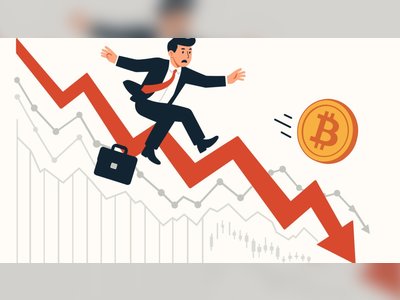
Research says that your 40s are your unhappiest age. It’s worse for millennials
All indicators to the contrary – the three children, the mortgage, the gray hairs, that little immutable fact that I was born in 1984 – the idea that I am approaching 40 is as discordant to my identity as is my bra drawer, which, since the pandemic and the birth of my one-year-old, consists mostly of slings. No, I think whenever I’m forced to confront my reality as an almost-middle-ager, I am still 22 and my silky, lacy undergarments would be more at home on a Victoria’s Secret billboard than in Ma’s closet on the prairie.
Yet here I am, along with vast swaths of other millennials who are starting to approach our most unhappy period of life. Oh, haven’t you heard? Happiness is U-shaped – it declines and bottoms out in your 40s, so report countless studies, until it starts to inch its way up again in the 50s. This is a remarkably consistent finding, across countries and cultures.
Though I consider myself decently happy – my kids are adorable and often astonishing, I have a strong marriage and enjoy my career, plus I no longer have to face lunchtime anxiety in the school cafeteria – I am, it seems, statistically fated to languish in the nadir, next to other sad, anxious, sleepless swamp creatures also living in the squeeze, with ageing parents and young children, and a veritable potpourri of stressful situations to sprinkle throughout my days.
This has been the case for anyone in mid-life for some time, with some studies pinpointing our most unhappy year to be precisely 47.2. But, I recently learned, we millennials may find ourselves uniquely screwed as we approach that low point in the curve.
My place on this “smile curve” took on new urgency when I came across the data from this year’s American Time Use Survey. The study by the US Census Bureau and Bureau of Labor Statistics measures how people spend their days – working, exercising, housekeeping, eating and the like. The latest report, using data from 2021, reports all sorts of depressing statistics. To pluck just one of many: Americans across all ages spend vastly more time watching television than doing literally any other leisure activity, including socializing, playing sports, reading, or “relaxing and thinking”, that Shangri-La of all time-use buckets, and one last successfully engaged in by Cicero.
But the worrying one for me pertained to those of us between 35 and 44 years old, the so-called “elder millennials” (a phrase I cannot read without flashing back to the moment when my obstetrician labeled my pregnancy “geriatric”, instantaneously evoking the image of my husband holding my walker as I nursed): apparently, we spend the least amount of leisure time of any other age cohort, and the least ever reported for our cohort since the survey was first released in 2003. When I read an article by a Bloomberg columnist, who crunched the ATUS numbers to pull that stat to the forefront, I thought, If no one else in my life ever really sees me, at least the Bureau of Labor Statistics does.
Ask any geriatric elder like myself, and it’s no real shocker why this is the case. Instead of leisuring, since 2003 we’re working more and caring for small children more. (Duh.) Sure, according to the study we’re also investing more time in “personal care activities”, a bucket which largely includes sleeping but also “grooming”, though I’ll be the first to admit that I no longer have to expend any time filing my nails because they are basically nubbins (thank you, anxiety!). But probably some of this increase is due to self-help that we have been forced to administer, post-pandemic, and, regardless, can the Census Bureau accurately capture the nuances of what “sleeping” looks like with three children under the age of six and a half?
Had I partaken in the survey last year, I would have wanted to clarify that with a newborn in the house, my husband’s Apple watch sleep tracker looked like a seismograph at the base of Vesuvius in AD79. Had I taken it last weekend, I would have piped up that the hours of 3.30 to 5am were spent driving my three-year-old languidly up and down back streets with the soothing sounds of Raffi lullabies playing, as I narrowly dodged small woodland creatures and willfully pretended she was drifting off (she wasn’t, and we were the first in line at the bagel store).
Suffice it to say, I’m not sure I need a national survey to illuminate my diminishing leisure time, and the depressing ways I choose to spend it. What interested me was how these two sets of data interacted. Here we are, not only marching grimly towards our most unhappy phase of life, but paring away at the pockets of time that might give us some reprieve, and paring away at them at a rate not seen in two decades. Would I really have to wait until my mid-50s to relax and think?
“Millennials got hit hard in so many different ways,” Carol Graham, an expert in the field of economics and happiness, told me. “The financial crisis, little kids at home during Covid – they’ve had a rough decade or two, and it’s coming at a critical point.”
Graham is a senior fellow at the Brookings Institution and a professor at the University of Maryland. She’s the author of several books including Happiness around the World: the Paradox of Happy Peasants and Miserable Millionaires.
In a paper entitled “The Mid-Life Dip in Well-Being: A Critique”, she, along with the Dartmouth economics professor Danny Blanchflower, resoundingly disputes skeptics of the U-shaped curve, pointing to more than 420 studies, mostly published in peer reviewed journals, that support the phenomenon. “The U-Shape pattern in mid-life even extends beyond humans to apes,” the researchers write, conjuring King Kong on a chaise longue.
In addition to big economic forces specific to millennials, such as the Great Recession, Graham mentioned the cultural ramifications of living in a country that not only doesn’t offer basic support, but also devalues leisure time and vacations in general.
“My guess is that the next generations may have it a little easier,” she surmised, citing a more forgiving labor market and the Great Resignation, which has empowered employees to say no, or demand more – at least those who are privileged enough to be able to do so in the first place.
There are data-backed ways to amplify one’s happiness, including being more altruistic, and that nebulous concept of “being active in your own destiny”, both of which Graham believes got a boost from the Covid years, with charitable giving rising, and recalibrated life priorities. And there’s at least one millennial-specific silver lining.
“Going through more difficult times in the long run has a payoff, because if you get through them, you’re more resilient,” Graham said. “You’re just able to weather the shocks better, even if it isn’t a perfect landing.”
So, fellow elder millennials, heads down. I’ll keep an eye out for your walker if you keep an eye out for mine.











